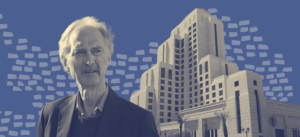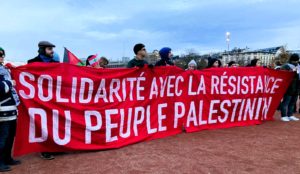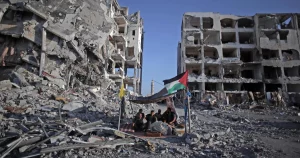I had the good fortune to finally get to Sicily, or at least Palermo and nearby locations, in early January. It was often cold and wet but there were few tourists and much to see. One morning I headed out early to visit the magnificent 12thcentury Norman-Byzantine cathedral in Monreale that overlooks Palermo. It was built with the help of North African and other Mediterranean craftsmen. It is renowned for its gold mosaics, stunning cloisters and panoramic views from a narrow walkway on the roof. The cathedral and other places of wonder in Palermo were granted UNESCO World Heritage status in 2015 given their architectural styles that are a fascinating fusion of Arabic, Islamic and Western cultural influences.
To escape a heavy hailstorm while waiting for a bus to Monreale, I took refuge in a small coffee house, ordered a cappuccino and soon noticed a young African man in deep conversation with two Italians who, it transpired, were helping him prepare for a demonstration later in the day. People were protesting anti-migrant legislation pushed by the far-right Deputy Prime Minister and Interior Minister of Italy, Matteo Salvini; it became law in November 2018.
The African teenager, who had arrived from the Sahel a few months previously, was preparing to speak on behalf of his local Municipality at the protest rally. He was dressed for the occasion in a dark suit and white shirt. He beamed with delight when presented with the Tricolore sash by the Mayor of the small neighbouring town in which he lived. The small town Mayor explained that he and others were in full agreement with Leoluca Orlando, the Mayor of Palermo, widely known for his welcoming attitude and measures to assist asylum seekers and other migrants in the city. The Palermitani – inhabitants of the city – enjoy representation on the Council of Culture where, as stipulated by Mayor Orlando, residency is the sole requirement to secure citizenship rights.
Being in multi-cultural Sicily was a constant reminder of the pivotal role of this island in the history of the Mediterranean that acts as a maritime bridge between the continents of Africa, Asia and Europe. Sicily has operated as a migration hub since antiquity. It has provided a home or place of conquest, culture, and commerce to a long list of peoples and civilizations. These include the Phoenicians, people from the Greek city-states, the Roman, Byzantine, Arab and Ottoman Empires, as well as Normans, Bourbons, French, Spanish, Austrians and Italians. Yet, in the second decade of the 21stcentury, the Mediterranean has become a contested space that, for asylum seekers and other migrants, is the most dangerous in the world.
Those who have fled their homes to escape war, persecution and life-threatening situations must now do battle with the lethal policies of the European Union. Brussels, in league with various EU Member States, has invested in the creation of a near-insurmountable barrier of constraints that makes the Mediterranean the most deadly wall in the world in order to keep out asylum seekers and other migrants in need of safety and a modicum of humanity. The number of recorded deaths in the Mediterranean in 2018 was 2,275. As smugglers do not maintain records of who or how many are crowded into their boats, the actual death toll is likely much higher. 2018 figures are lower than previous years given fewer attempted crossings, but the mortality rate has changed from one death at sea for 269 arrivals in 2015 to one death for every 51 arrivals in 2018, according to the International Organization of Migration (IOM).
My brief morning encounter in Palermo with those preparing to protest the policies of Salvini and others was a reminder of the opposing visions of the EU and its Member States. Europe has yet to address the downsides of globalization that are threatening job security, turbo-charging inequality and fuelling populism. This, in turn, is adding to the ranks of racist and other groups that champion narrow notions of them-versus-us style nationalism. At the same time, there are millions of Europeans who know that the anti-migrant narrative capitalizes on a vacuum of political and moral leadership in the upper echelons of the EU project. In cities and villages across Europe, committed citizens and local officials challenge the demonization and marginalization of those forced to flee while also working to mitigate the harm inherent in policies that treat refugees and other migrants as lesser human beings.
Bloody Borders
Historically, before the age of nationalism and nation-state sovereignty, people on the move did not have to worry about borders in the conventional sense. The Silk Road route, in operation from the time of the Han dynasty (206 BC-220 AD) to the fifteenth century, linked the Mediterranean with China. Silk Road travellers needed to understand the culture, climate, geography, political situation and a host of other factors to ensure a safe journey, but passports were not required. When Marco Polo, one of the best known Western voyagers of the Middle Ages, set off from Venice in 1271, the Silk Road was an important part of his epic journey to the court of the great Mongol Emperor, Kublai Khan, in Xanadu, near modern day Beijing. The young Marco was employed by the Emperor to help in the administration of his vast empire.
In contrast to the Middle Ages, contemporary forms of globalization that thrive on the ever-deeper integration of global trade, communication networks, capital, goods and services, are antagonistic to the free movement of people, particularly if they are poor, culturally different, or fleeing to hold on to their lives. According to Reece Jones, a political geographer and specialist on the militarization of national frontiers, the borders of the EU are now the most deadly in the world. His research shows that some two-thirds of all migrant deaths occur en route to, or at the EU’s border. Tellingly, this contrasts significantly with the US-Mexican border, long a source of tension and headlines. Elsewhere, there are more border walls than before as these grew from 15 in the 1990s to 70 today.
More walls, whatever their shape or construction, have translated into a higher mortality rate. 56,800 people died or disappeared while crossing an international border between 2014 and 2018. The same trend is evident in Europe where the odds of dying while crossing the Mediterranean have increased even though the actual number of migrants making the journey has decreased. This can be attributed to the determination of Brussels and state capitals to maintain deterrence measures that prioritize blocking the arrival of asylum seekers and others over the steep human cost of EU policies.
Criminalized Deterrence
Eighty-five percent of the global refugee population is hosted in poor countries in the Global South but a ‘Fortress Europe’ mentality has shaped EU policy for some time. Efforts to strengthen measures to deter the arrival of asylum seekers and others gained momentum after Europe’s so-called migrant crisis when the number of asylum seekers from Syria, Afghanistan and Iraq quadrupled between 2013 and 2015. The flow of forcibly displaced people seeking refuge in 2015 exposed serious flaws in the EU’s asylum system. These flaws have become more pronounced since then.
Lack of solidarity between European states combined with measures to impede and criminalize asylum seekers and humanitarian actors struggling to save lives in the Mediterranean and elsewhere, have given rise to policies and practices that further imperil endangered people. These policies that are ostensibly in place to disrupt smugglers are, in reality, cynical let-them-die deterrence measures that feed a racist, anti-migrant narrative to advance far-right political agendas at odds with international law and humanitarian norms.
The deterrence programme includes a range of measures such as the 2016 EU deal with Turkey to obstruct the flow of migrant into the Eastern Mediterranean. With one of the shortest maritime routes to Europe blocked, the EU made a deal (2017) with Libya in exchange for financial and other support to beef up the Libyan Coast Guard to restrict trans-Mediterranean migration. Studies by Amnesty International and others show that the Libyan Coast Guard (LCG) routinely interdicts people headed to Europe and re-locates them to horrific Detention Centres where torture, rape and sexual exploitation is the norm. Some detainees are subjected to slave-trade commerce and extortion rackets run by different militia and other groups linked to feuding Libyan authorities. The return of at-risk people to Libya is in contravention of international refugee law that prohibits the refoulement or forced return of individuals to places of persecution. This practice also runs foul of international maritime law that requires the rescue of those in distress on the high seas.
In 2014, Italy’s Mare Nostrum air and naval rescue programme that saved thousands of lives in the Mediterranean was replaced by the EU Triton-Frontex border control operation. Soon afterwards, various non-governmental search and rescue (SAR) operations emerged to provide a lifeline to flimsy craft in distress and over-loaded with would-be refugees. This included the SOS Méditerranée, a coalition of German, French, Italian and Swiss Médecins Sans Frontières (MSF) teams working on the Aquarius that has rescued or assisted more than 80,000 people in the Mediterranean since 2015. Other privately funded rescue ships included the Migrant Offshore Aid Station (MOAS), Sea Watch, Sea Eye, and Proactiva OpenArms. All of these and other life-saving operations are no longer able to function in the Mediterranean given a sustained campaign of sabotage and obstruction. In June 2018, Italy and Malta closed their ports to rescue vessels. In December, the Aquarius was blocked from leaving the port of Marseille.
Zeid Al Hussein, the UN High Commissioner for Human Rights, speaking in September 2017, noted that EU plans could not disguise the fact that its core concern about Sub-Saharan migrants transiting through Libya was stopping them from reaching Europe. The general absence of legal and safe opportunities that would allow non-Europeans to lodge asylum claims or apply for residency permits drives individuals into the hands of smugglers. But as noted by MSF President, Joanne Liu, in 2017, the EU-Italy-Libya arrangement is feeding an abusive criminal system that treats people as commodities to be exploited. Europe, it could also be said, is using the Mediterranean as a deep blue burial chamber for those who conclude that they have little to lose when their choice is abandoning their homes to escape torture and other threats to their survival or embarking on a journey that risks abuse, pain and suffering that brings their life to a premature end.
Reforming Europe’s asylum system – Saving lives in the Mediterranean
Once upon a time, the Mediterranean was a vital crossroads that facilitated the growth of diversity, wellbeing and aspirations of the people who populated the region and beyond. These days, it is a battleground between those seeking freedom from fear and deprivation and European states intent on, and indifferent to the consequences of policies that condemn thousands to the depravity of Libya’s detention system or near-certain death in the Mediterranean.
The EU asylum system is not fit for purpose. It aids and abets the smuggling rackets it claims to abhor. Palermo’s Mayor Orlando noted in January that the EU’s anti-migrant regime is antagonistic to human rights and incites rather than fights criminality. The EU needs to manage migration in a way that reflects a long and noble European tradition of helping people in distress. It needs to show the leadership that gives credence to Europe’s claimed enlightenment values. This means an asylum system that prioritizes the right to life over all other considerations. It means an asylum system that shares responsibility for delivering on Europe’s international protection obligations.
As noted by George Steiner, we are all accomplices to that which leaves us indifferent. People everywhere can add their voice, by word and deed, to the many efforts dedicated to undoing the cynical and cruel policies that condemn fellow human beings to the nightmarish conditions that push them into the Mediterranean. United Against Inhumanity, preoccupied with war-related atrocities and the erosion of the global asylum regime, has a ‘Call to Action’ that demands an end to the policies and practices that prevent people fleeing for their lives from reaching a place of refuge. European citizens can use their vote in upcoming European and other parliamentary elections to assert the necessity of humane asylum policies. Everyone has a role to play in challenging the inhumanity of policies which ensure that the survival chances of people in need of refuge have continued to diminish as Europe’s wall of death takes its toll every day.
Photo caption: “The Mediterranean: the most deadly wall in the world”











